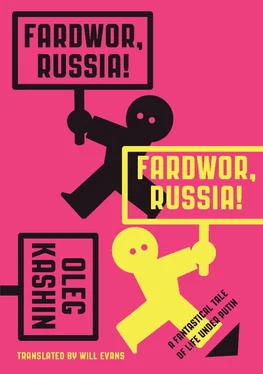Most likely, they could have just slipped away without being noticed, but the evening’s honoree came up to them; she was a woman in her fifties, also a blonde, but whose hair, unlike the other blonde’s, was obviously bleached. They had not seen her in the assembly during the festivities, but here it was somehow immediately apparent to them that she was the most important person in town. Elena Nikolaevna was holding two glasses of champagne. She gave them to Marina and Karpov, leaving herself empty-handed; Karpov undertook to go get her some champagne, but Elena Nikolaevna followed him, and he somehow understood that this whole invitation had been contrived precisely for this moment, for an important and sensitive conversation, and that now he would be hearing something that, though not really of any importance to him, would nevertheless unpleasantly complicate his life.
And so, as he handed a glass of champagne to the director, he himself initiated the conversation—he said that in his childhood, walking around the institute with his grandmother, he had understood that the most awe-inspiring people in the world worked right here in this very building, and that he was now very glad to meet the person in charge of all these awe-inspiring people. In his improvisation, Karpov hadn’t been able to come up with precisely what made those people so inspiring, so he cleverly changed the subject to a touching reminiscence: by the main entrance to the institute, there had been a display board with a sign reading: “Best People,” and once, he, only five years old at the time, had cried because he hadn’t found his grandfather on the board (who, of course, was the best person ever), and he stopped crying only when his grandmother took him inside the building and showed him another board with photos of war veterans, among whom he saw his grandfather. Afterward, as Karpov found out years later, his grandmother had gone to see Professor Pilipenko, the now-deceased former director of the institute, and she had talked him into replacing the “Best People” sign that was traumatizing for little kids with a neutral “Board of Honor.” Elena Nikolaevna laughed politely—politely enough for Karpov to understand that he wouldn’t succeed in small-talking this woman, and, alright then, he would just have to listen to whatever it was that had made her drag him here in the first place.
Elena Nikolaevna started out in general terms. She asked whether Karpov had liked the speech, and, before he could answer, she started talking about Vyacheslav Kirillovich, who, since he had graduated from the Russian State Agricultural University, was not at all familiar with cutting-edge nanotechnologies. She had a problem; all of her correspondence with the Russian Nanotechnology Corporation had to do with the fact that her institute didn’t have a single project, not even any crazy idea that could attract the interest of the corporation that could lead to a source of revenue. That’s why, starting the next month, Vyacheslav Kirillovich’s job title would become more promising—“Deputy Director for Innovations”—and she, as the director, would go to Moscow and start searching for a source of big money in different places; at the current time, innovation was in fashion, and Elena Nikolaevna had the power of persuasion.
“I have a talent for persuasion,” she repeated, “but, alas, not for generating ideas. And you can understand how glad I was to learn that a mysterious genius had shown up in our little town, and had gone ahead and built himself a laboratory and begun doing some kind of brilliant research all by himself without even asking me for any help.”
Karpov had never been called a man of genius, not even by Marina, and though he ought to have been embarrassed by what she said, for some reason he wasn’t—it was clear to him that in the time he’d been here, the talkative Gennady had managed to tell everyone that Karpov was doing some kind of experiments on rats in his shack; but Gennady couldn’t fathom the nature of those experiments, therefore Elena Nikolaevna couldn’t either; and if that were so, then why would she compliment him? Karpov raised his glass for a toast, and said that he was very flattered by praise from such a distinguished person, which he, of course, considered Elena Nikolaevna to be, but he could not understand what she was getting at. They clinked glasses. The director gulped down the champagne like vodka, with a grimace. She smiled:
“I really have no idea what you are doing in there with those rats. It’s fine, do whatever you’d like, even clone them. I can offer you a position as a senior research associate and a proposition—I will be your… ”
“Censor?” Karpov recalled such a moment from Pushkin’s life, but he already understood where the director was heading.
“No, not your censor,” Elena Nikolaevna smiled once again. “Your co-author.”
Her plan was simple: she had to have something when she went to Moscow. She didn’t have that “something,” but Karpov did. She didn’t care why he was occupied with that “something,” but it would be useful for the institute to have an idea—any idea—one that sounded good, whether or not it could be realized, something based on any sort of laboratory experiments. And if she was to be completely honest, the institute had not been doing any scientific work for some time now; instead it had been earning cash by renting out its facilities and land—this gave a steady income, but it was not all that much. But there was big money lying around these days and at that very moment important people in Moscow were determining which establishments to include in a federal target program called “A Well-Fed Russia,” whose mission was to foster innovative technologies in agriculture. There are many agricultural institutes in Russia, and it would be a shame if some slackers from Belgorod or Krasnodar were to get their hands on the government’s millions; because obviously if anyone deserved the money, it was this institute, the one to which Karpov’s deceased granddad had dedicated years of his selfless labor. Karpov didn’t understand what his grandfather had to do with it, but he nodded anyway.
“I’m so glad that you agree,” Elena Nikolaevna whispered fervently. She had already come up with a plan: the next morning Karpov would bring her a description of his work, she would stamp the institute’s seal of approval on it and fly off to Moscow to get the money. Of course she would have to give almost half of it to the official in the ministry in charge of the allotment of funds for the program, but Karpov shouldn’t worry—there would be lots of money, enough for everyone, including him.
Karpov understood about half of what the director was saying. What he did clearly understand was that it had to do with some sort of corrupt scheme; it didn’t really bother him that Elena Nikolaevna was hoping to use his help to rob the state; he had no warm feelings for it anyway, and he wouldn’t even object to this state money going to this particular woman—if it didn’t go to her, someone else would steal it all the same. But the co-authoring proposition had really offended him for some reason. He had no doubts of his invention’s future success, and being a conceited person by nature, for a long time he had pictured himself—if, of course, not as a Nobel Prize-winner (after all, he wasn’t even a scientist, but rather, just an amateur inventor), at least someone who would appear on the front-page of all the world’s major newspapers. And when he pictured this woman by his side on the front page, he got really angry. He wanted to be polite and say that he would definitely think over her enticing offer, but instead, he grumbled, perhaps more rudely than he should have: “No, I am not interested in your offer,” turned and walked away.
Читать дальше




![Stephan Orth - Behind Putin's Curtain - Friendships and Misadventures Inside Russia [aka Couchsurfing in Russia]](/books/415210/stephan-orth-behind-putin-s-curtain-friendships-a-thumb.webp)






